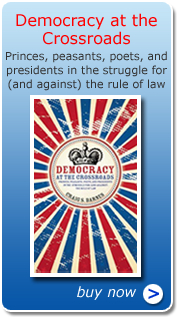The Wall Street Journal wrote last week that “Mr. Obama's policies are slowing, if not stopping, what would otherwise be the normal process of economic recovery.” Conservatives citing this article therefore now proclaim that return to the “free market” will be the basis for the campaign for 2012.
Over a thirty-year period since Ronald Reagan, the free market has led the finance industry into sub prime loans, predatory lending, insulation of lenders from borrowers, credit default swaps and a corrupt rating system. The trend has now climaxed in a crisis of worldwide unemployment, the loss of export markets for the US, Germany and China, and failure of consumer confidence. It has led to dependency on foreign oil, a broken health system, failing education and a declining middle class.
The free market has produced bankers who lost connection to their borrowers and turned themselves into speculators. The free market gave us failures at Wachovia, Washington Mutual, Bear Stearns, Lehman Brothers, Bank of America, AIG and Citigroup none of whom could make a balance sheet balance. Unregulated markets gave us serious capitalists who have seriously damaged the idea that capitalists know what they are doing.
Former presidential candidate Mike Huckabee cries out, however, that any st ep toward regulation is a return to the policies of Lenin and Stalin. He does not distinguish government aid from government takeover and to him any venture away from the free market is socialism.
Conservatives argue, further, that it will speed recovery to allow some people to fail. Out of such failure will come re-structuring. Those at the economic bottom will suffer the most, perhaps, but it is argued that they may have been the most irresponsible. That is a hard case to make, however, in a time when the largest banks have been leveraging their debt beyond any capacity to measure. There is clearly enough irresponsibility to go around.
Harold Meyerson of The Washington Post points out that there are three sources of revenue to get the economy going again: investment, consumption, and exports. When none of these is happening—as they are not now happening—then the only source of money to re-fuel the economy is public spending. That eventually means taxes. Not stamp taxes for King George III as in 1775, but taxes to create real wealth that can be the foundation for investment and export, for the highly moral purpose of aiding the whole population.
For The Wall Street Journal, however, and Mike Huckabee—and add to them Rush Limbaugh and the Reaganites from 30 years ago—taxes are evil. Today, that is the rallying cry of Republicans in the US House of Representatives. Condemn all taxes.
But taxes are not all evil and can be very good. Taxes can be the fairest way a community spreads out the cost of health, education, or care for our oceans and forests, our poor and our artists. Taxes are the way to build public works that do not earn a direct profit but in the long run are the foundation of economic success. Taxes built the highway system that Dwight Eisenhower sponsored and the transcontinental railroad for Abraham Lincoln and Land Grant colleges and the GI Bill to educate millions. Taxes paid for the Hoover Dam and the Tennessee Valley Authority and a hundred, hundred bridges, museums, sports stadiums, and parks and all these lead to jobs and increase the quality of our lives.
Taxes are how we do the things that are not sufficiently profitable in the short run to lure private investment. They are how we do projects for the good of the whole when these will not immediately benefit some stockholders but will make us all safer, or healthier, or more productive. It is hard to put a market value upon safety, or a healthy or an educated population, but there can be no doubt that safety, health, and education produce great common wealth.
It is delusional therefore to dream of a society that does not tax to pay for these things and it is irresponsible to argue against all taxes in principle. That is a greater irresponsibility than buying too much house, or even leveraging too much bank debt. That is an irresponsibility that urges the community to ignore the common good, across the board, a propaganda campaign that touches and degrades the lives of us all.
We are launched into a profound national conversation about all this, and yes, we should welcome the chance to stand up for the common good.
Even if we do have to pay for it.
Of course we have to pay for it.
Even if we have to regulate the free market. Of course we have to regulate the free market.
This is not utopia. This is the real world.
